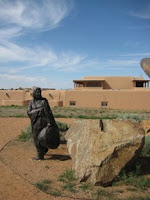
How alone can you feel? I’m indulging myself to allow myself to think that my experience this week qualifies for any record book. Yet, all experience is relative. I am still a stranger in this land, even though I have neighbors, know business people—some long-standing relationships—have a church, and now I’ve started volunteering. Late yesterday I decided to head out to Urgent On Call medical on St. Michael’s, really after being encouraged by a friend from Texas and by someone on the staff at Kitchen Angels, where I was to have started my volunteer service yesterday afternoon. I had been sick in bed for two days with flu-like symptoms, although my symptoms had begun to develop late last weekend. “You don’t want this to turn into pneumonia,” the Kitchen Angel staffer offered, putting the fear of something into me. Finally, with encouragement from Nancy, who is traveling West with her husband and stopping over in Santa Fe for a couple of weeks, I made the last-minute rush to get to Urgent On Call before their office closed at 6 p.m.
The diagnosis—very mild pneumonia in the lower right lung. With a super dose of Erythromyacin and Arbuterol inhalant in-hand, by 7 p.m. I had begun my treatment. To say that I felt relief last night at midnight when I awakened, realizing that I had begun to feel human again, is no understatement. Here in this maze of 260 condominiums where, with the exception of my neighbors and new friends Gail and John who visited from upstate New York during the month of May, my relationships remain a nod and a hello, sadly, not enough for anyone to know or care that I might be in distress. Only the birds pecking away at the grain and other treats on my deck lend a cheering voice to the otherwise rumbling and booming of condominium doors slamming around me and cars and large trucks making their way north on U. S. Hwy 84 to Colorado or south to, well, anywhere south, I guess.
This morning, I made it out to Morning Prayer and Bible study at the Episcopal Church where I worship here in Santa Fe. How great it felt to focus on something other than my aching, fevered body, in spite of an annoying cough and dripping nose. How thankful I am that I could make that trip, in the truck owned jointly by Compass Bank and me, driving myself, my head clear enough to notice other drivers and change lanes safely in the early morning rush of workers to New Mexico state offices downtown.
On my way home from St. Bede’s I stopped at the laundry where earlier this week I had left some slacks to be altered. As I waited to get back on to St. Francis/U.S. Hwy 84, hoping that someone would be considerate and let me into the flow, especially since there was an 18-wheeler blocking the entire northbound flow of traffic just ahead, I was denied this courtesy by a woman driving a Lexus SUV, her mid-sized manicured poodle dancing around the front seat. On her rear bumper was pasted a sticker with the slogan, STAY HUMAN. Hmm, you do the GOOGLE search and see what you turn up. Thankful, I am, still to have been out and under the sunny skies of this high desert place, what some call the city different, others the city indifferent and the city difficult. As I headed into the mall near my house to mail a bill at the post office and get a haircut, I thought to call my Kitchen Angel and thank her for planting the seed of caution with me. I don’t know if I made her day, although she seemed delighted to hear from me.
At Bible study we read from Genesis the story of Noah and his ark, and we had much discussion of this incredible tale. We didn’t focus on whether this event occurred, however. As usual, our thoughts took us all over the map of our individual and collective journey. The priest, who along with his wife guides our regular Friday morning exploration, said one thing in particular that sticks with me this afternoon. Salvation is not an individual act. It is not about the “I”. It is, rather, a corporate act, and our role is to bring as many pilgrims as possible to the kingdom, now, in this place. I guess this must apply as well to self-absorbed drivers of Lexus SUVs, miniature poodles dancing in the front seat, sporting STAY HUMAN stickers neatly attached to the rear bumper. Yesterday afternoon, as I headed out to the Urgent On Call office in afternoon rush hour traffic, I consciously welcomed two different drivers waiting to enter the flow of traffic. It felt really good, even though I failed, and grimaced, at the third opportunity. I was trying to beat the 6 p.m. closing of the office.
How Alone Can You Feel—Santa Fe New Mexico (May 30, 2008)
R. Harold Hollis







